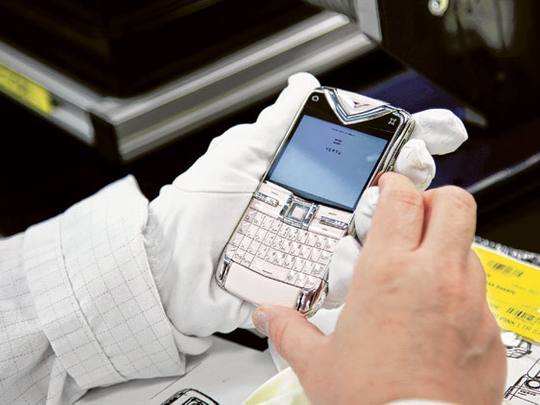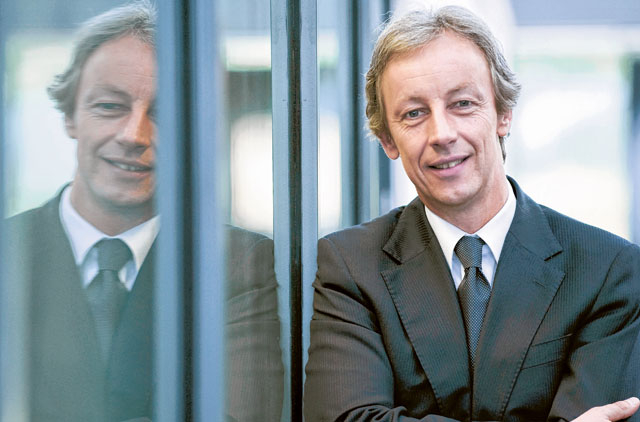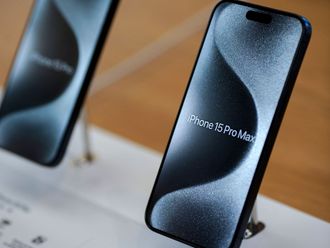
Dubai: As global smartphone adoption continues to accelerate, it was only a matter of time before Vertu got into the game. The Nokia-owned company — known for its hand assembled, blinged-out devices — wants to move with the times with its new full touchscreen smartphone called Vertu Constellation.
Launched on October 18 at a star-studded event in Milan, the device, CEO Perry Oosting hopes, will transform the UK-based company by taking advantage of its existing bouquet of with-phone services and ‘bringing it alive' on a bigger touchscreen.
Purchase of a Vertu phone gives users access to a ‘concierge' service through which they receive priority bookings to events and assistance around the world. With the Constellation, the company has introduced new applications and services, including one for personal security and access to exclusive clubs.
While its relationship with the Finland-headquartered Nokia is never referenced, Vertu, which does not publish sales figures, has become a dominant player in its category, according to IDC, with surging demand in the Middle East, Russia and China often cited as catalyst.
Gulf News was invited to the Milan event and spoke with Oosting about the smartphone market, the technological challenges of making a luxury phone and his vision for the brand.
GULF NEWS: Are you satisfied with the way your first touchscreen phone has turned out?
Perry Oosting: I am very happy with how we are transforming as a brand and as a company. I think it's quite noticeable because we started this journey with our services, and now they're coming alive for the first time because we have a touchscreen and a wider screen.
Why did you choose Symbian as an operating system?
All our devices are Symbian. This OS gives us maturity in terms of software that is down to what we still believe is more important than anything else.
We are not making a mini-computer. We are making a mobile device with a 3.5-inch [8.9cm] screen through which we want to deliver technology that does what it needs to do, has a great battery life, connectivity, imaging and sound — and be best in class.
You have all these new beautiful platforms everybody is writing about. But what do you do if you have just three hours standby time?
Is that luxury? Is that giving you security? These are the elements that are important to us and Symbian was an obvious choice.
But even Nokia is phasing out Symbian as an OS of choice on its phones…
Symbian is a word that has been misused by the press and the public. If you actually start using the device you will notice the difference.
We have given it to some of the consultants we work with and they've been really astonished with what we have done with it. These are technology experts, not people who work for us.
We can stand up and say: "If somebody has to criticise it, use it first. Take it in your hands, compare and let us know what you think".
So would you say the Constellation is a smartphone with a great hardware, software or experience?
It's a combination of the three. It has amazing hardware — think of the sapphire glass screen for instance.
But at the same time, there is an interlink with technology. If you talk about imaging solutions, your mass-market device has a plastic screen which scratches in your pocket or bag. You might have the best software, but still looking at a scratched device.
So it's a combination of the elements. You have great web browsing capability and at the same time you have an alternative choice, the centre point of which is the Vertu experience.
How involved was Vertu in developing your associated experiences?
All the collaborations we have are with people that are specialists in their fields. We are not specialists in protective services.
But these associations are topics based on the passion points and what is important to our customers.
How important is the Middle East to Vertu?
The Middle East has always been an important market because it was one of our first and it was a quick adaptor to our proposition. When we started off, it was much more about the materials and I think we made some mistakes in the past where we were overstretching it in terms of materials like gold and diamond. It was a one-sided proposition.
But if you look at our relationship today, it's a much more three-sided proposition. Yes, we've stayed loyal and true to our hardware and at the same time we've evolved in the service proposition as well as the technology element.
The Middle East dem-ographic is also much younger and that is exactly where the Constellation comes in the right place. It's an important market; not the biggest, but one that is quite true and loyal to the brand.
Despite its Dh20,000-plus price tag, the Constellation is an entry-level phone. Was this deliberate to make it more attainable?
Yes, we want to be more attainable. But if you want to make a device like we have to offer, you have certain limitations in terms of where you can go with your price.
It is hand assembled and the cost of the service proposition, which we completely bear, is not a revenue stream. The concierge service is totally at our cost, for instance. You have barriers where you cannot go lower.
How is the luxury phone market faring from your perspective?
It's still relatively small. We were the first ones to start it when we had this crazy idea to make luxury mobile phones.
We were laughed at in the beginning but more and more are coming into it because they've seen there is an opportunity.
Companies like Tag Heuer, Versace, Dior and some of the watch brands are looking into it. We are happy with that because it gives a wider attention to the category, but also keeps us at a speed to be better.
What next after Constellation?
We see a future in smartphone-centric offerings. So we will have a lot more touchscreens coming.
We still believe in these kind of mobile devices so we want to have a wide portfolio because our customers are using multiple devices.










